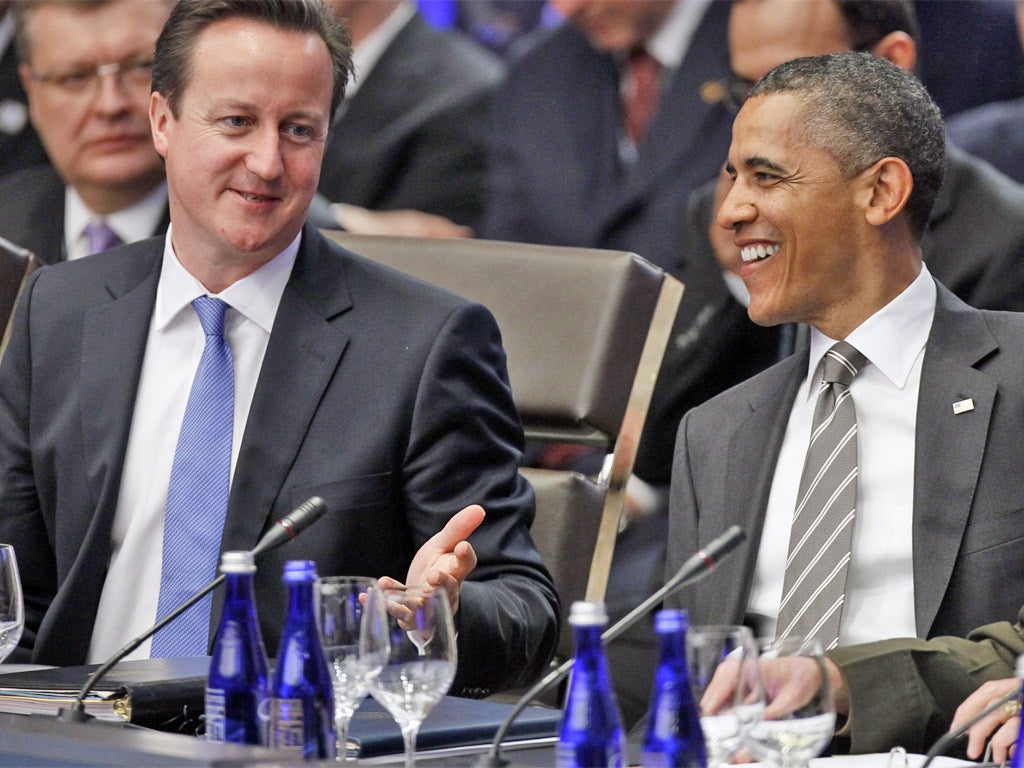Barack Obama piles pressure on David Cameron over EU exit
Downing Street plays down US President’s personal intervention ahead of Europe speech

Your support helps us to tell the story
From reproductive rights to climate change to Big Tech, The Independent is on the ground when the story is developing. Whether it's investigating the financials of Elon Musk's pro-Trump PAC or producing our latest documentary, 'The A Word', which shines a light on the American women fighting for reproductive rights, we know how important it is to parse out the facts from the messaging.
At such a critical moment in US history, we need reporters on the ground. Your donation allows us to keep sending journalists to speak to both sides of the story.
The Independent is trusted by Americans across the entire political spectrum. And unlike many other quality news outlets, we choose not to lock Americans out of our reporting and analysis with paywalls. We believe quality journalism should be available to everyone, paid for by those who can afford it.
Your support makes all the difference.David Cameron’s trouble-prone strategy on Europe suffered another setback when US President Barack Obama made a personal appeal to him not to allow Britain to drift out of the European Union.
Mr Obama’s intervention came only hours before the Prime Minister was due to make his landmark speech on the UK’s relationship with Europe.
Mr Cameron had planned to warn that the British public could “drift towards the exit” of the EU unless it reformed.
But Mr Cameron called off his speech in Amsterdam so that he could remain in London to deal with the unfolding hostage crisis at a BP gas complex in Algeria.
Downing Street did not reveal Mr Obama’s plea but the White House disclosed: “The President underscored our close alliance with the United Kingdom and said that the United States values a strong UK in a strong European Union, which makes critical contributions to peace, prosperity, and security in Europe and around the world.” No 10 had said earlier that the two leaders discussed the Algeria situation.
Today Downing Street confirmed that Mr Cameron and Mr Obama spoke about the postponed Europe speech and agreed that a debate was needed because of concerns in Britain, “but the hope is that Britain will stay in”.
Mr Cameron’s official spokesman played down any differences with the American President, saying the telephone call was “very friendly, very constructive.”
Mr Cameron’s spokesman added: “The US were stating their position. That is one we entirely agree with.”
The Prime Minister’s aides insisted there was no conflict because Mr Cameron – in the long-delayed speech that he may now deliver next week – will make clear that he does not want Britain to leave the EU.
He will say: “I want the European Union to be a success and I want a relationship between Britain and the EU that keeps us in it.”
Martin Callanan, chairman of the European Conservatives and Reformists group in the European Parliament, said it was very important for the Tories to offer a “solid commitment” to a referendum, which would help to see off the threat from the UK Independence Party (Ukip), which supports Britain’s withdrawal from the EU.
He told the BBC’s Daily Politics programme: “Clearly they [Ukip] are going to take votes away from us, anybody who doesn’t vote Conservative is a threat for us and I think Ukip is a genuine problem.
“It gives us a chance to say to the many disenchanted Conservative voters, ‘here is the referendum that you want’, and it’s only a Conservative government that’s going to deliver it. Ukip aren’t going to be in power after the next election.”
Latest opinion polls show that Mr Cameron is on safe ground in arguing that the “status quo” in Europe is not acceptable. The public agrees.
But the polls also suggest that Nick Clegg’s belief that Mr Cameron is “playing with fire” by offering a referendum might also be right. According to YouGov, only 50 per cent of the public would vote to stay in the EU if Mr Cameron renegotiated the UK’s relationship with it, told them Britain’s interests were protected and recommended continued membership on new terms. Some 25 per cent said they would still vote to quit the EU, while the others were either unsure (20 per cent) or would not vote (5 per cent).
Joe Twyman, YouGov’s director of political and social research, said: “When given a straight ‘in/out’ choice, currently public opinion is strongly towards withdrawal, and when given the option of staying in the EU on renegotiated terms there is still only 50 per cent support.
“Therefore, David Cameron will have to hope he is able to persuade enough voters that whatever negotiation he does achieve is accepted by the British people, because if he doesn’t then we could well be headed for the Brexit he hopes to avoid.”
Join our commenting forum
Join thought-provoking conversations, follow other Independent readers and see their replies
Comments